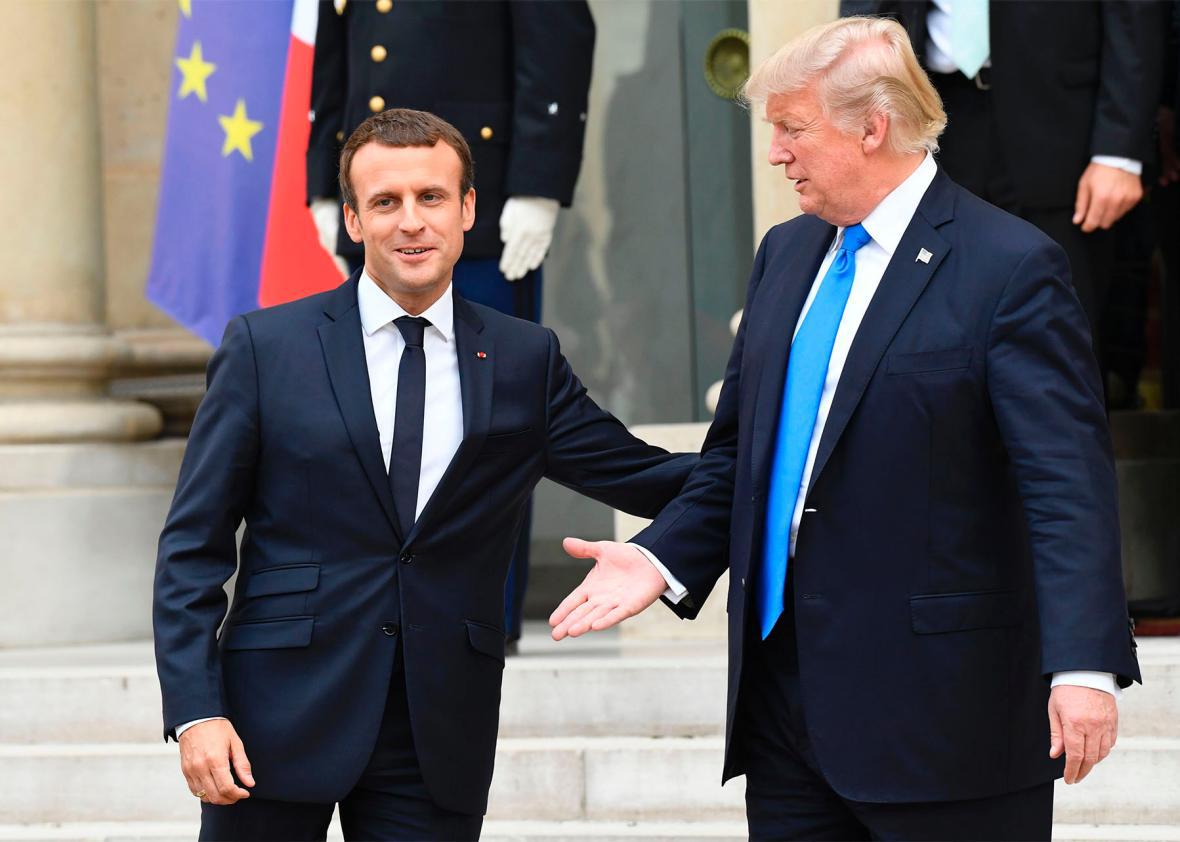With one shrewd move, French President Emmanuel Macron has displaced German Chancellor Angela Merkel as the leader of the European Union—or at least as the EU’s face, voice, and ear to its vital trans-Atlantic partner, President Donald Trump.
Macron has clearly learned, and put his own spin on, the lesson that all world leaders have noted in their dealings with Trump: To get something from this new American leader—whether it’s friendship, weapons, concessions, or whatever—you just regard him with respect, slap his back a time or two, in short, treat him the way all too few do in his homeland: as a world leader in his own right.
So, after showing his fangs and a death-grip handshake in his first meeting with Trump at a NATO summit in Brussels in May, Macron invited him to the Bastille Day celebration, to be held Friday. And Trump accepted, in part because the event, he learned, was a gigantic military parade. (Trump loves military parades and in fact wanted one for his inaugural festivities, but the Pentagon turned down the request.)
At their joint press conference, following a working session on Thursday, Macron welcomed Trump as a peer and partner and said their time together had left him “extremely pleased.”
Not long ago, Trump dissed Paris, telling a conference of conservatives that a friend of his named Jim, “a very, very substantial guy,” had warned him to stay away from the City of Lights because it had allowed in too many radical Islamists. “I don’t go there anymore,” this mysterious Jim said. “Paris is no longer Paris.” (Around the same time, Trump said that Brussels, for the same reason, had turned into a “hellhole.”)
At Thursday’s news conference, asked about this insult by one of the attending French reporters, Trump shifted gears and described Paris as a “beautiful” city, adding, “It’s going to be just fine, because you’ve got a great president … a tough president … I’m coming back.”
Trump also said, “The friendship between our two nations—and ourselves, I might add—are unbreakable.” When he said “and ourselves,” Trump reached out to touch Macron’s shoulder, a gesture that drew Macron’s smile but not his reciprocation.
When a reporter asked Macron if he saw their relationship in the same way, the French president defined it in more Cartesian terms. “I never want to comment on who we are,” he replied, “but I can tell you,” the meal that he and Trump were about to share “will be a dinner between friends because we are the leaders of two countries” with a history of friendship.
Macron may have been amused when, during his opening statement, Trump said, “France is our oldest ally,” then—in an apparent departure from text—looked up and said, “A lot of people don’t know that.” Of course, everyone who knows the slightest thing about the American Revolution—or who has ever heard the soundtrack of Hamilton—knows that. When Trump says a lot of people don’t know something, it usually means that, until he read it in the speech before him, he didn’t know it.
The two presidents expressed agreement on most of what they discussed, as the United States and France do have similar interests on many issues, not least counterterrorism. On Syria, Macron said that he no longer requires President Bashar al-Assad’s departure as “a prerequisite” for a peace deal or a political settlement. Trump has taken this position too; in fact, in his final months as President Obama’s secretary of state, John Kerry also said, though more grousingly, that Assad could stay in power a while longer, if just to maintain stability.
In the one bit of possible news, Trump said that the cease-fire in southwest Syria, which he and Russian President Vladimir Putin had struck at the G-20 summit, might soon be followed by a cease-fire in another, more violent part of the country, though he did not elaborate. Meanwhile, he boasted, the southwest cease-fire had held now for five days, which he depicted as a long time.
Finally, perhaps without realizing it, Trump threw his son Donald Trump Jr. under a few more wheels of the bus. Asked about the meeting that his son had with a Russian lawyer during the 2016 campaign, he said, as he’d told one reporter earlier, “Most people would have taken that meeting,” then added, “It’s called oppo research,” which is common in politics. Oppo research is indeed common, but as my colleague Dahlia Lithwick recently wrote, it is a crime under federal statutes “for a foreign national, directly or indirectly, to make a contribution or donation of money or other thing of value” to a candidate in an American election.
Oppo research, as Trump would be the first to acknowledge, is a thing of value.
